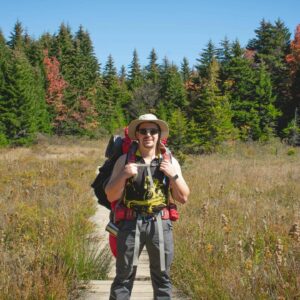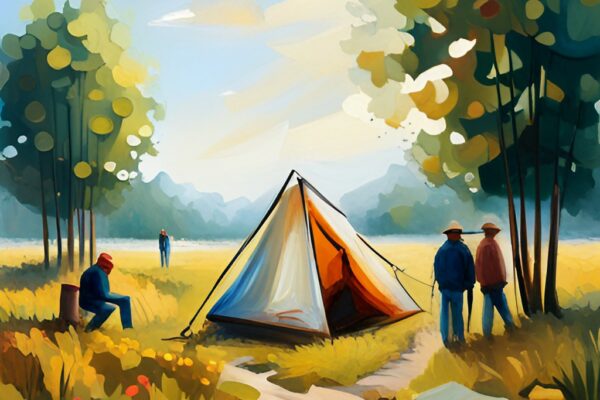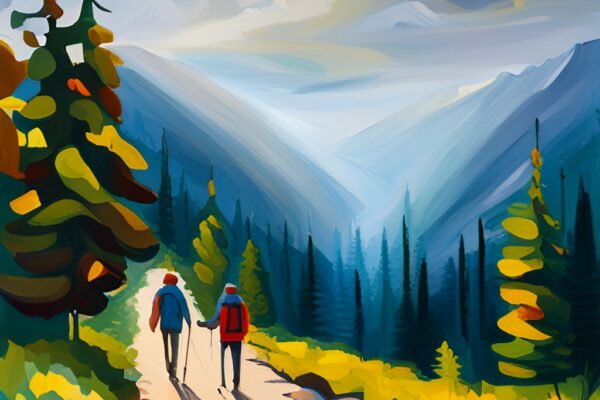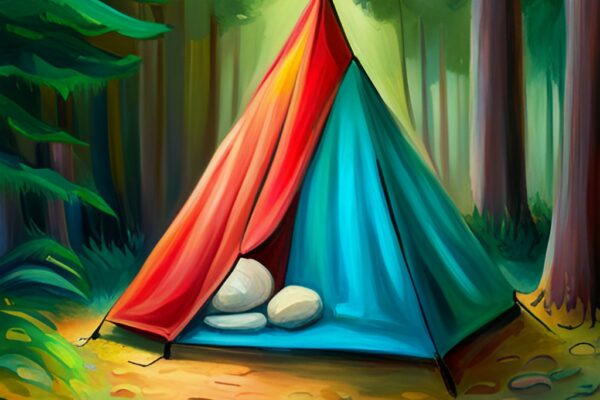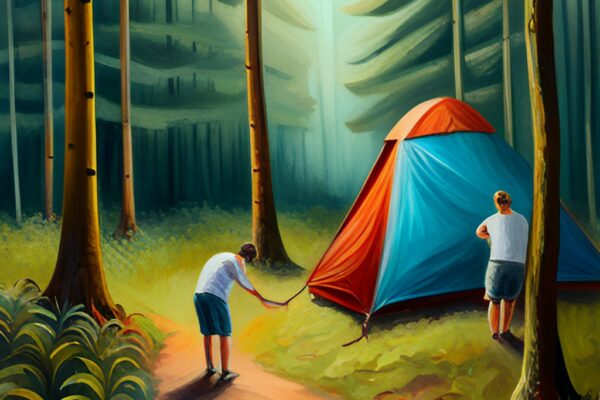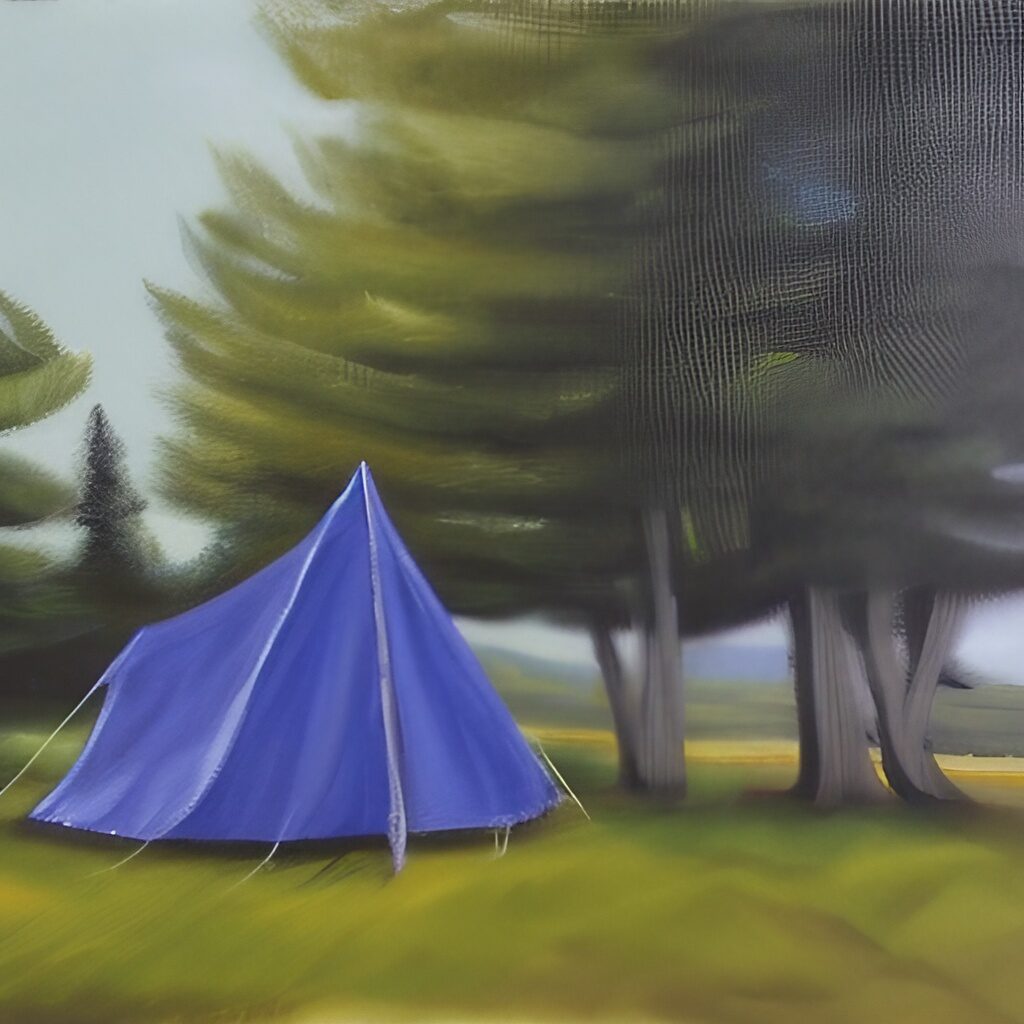
Most of us who consider ourselves campers relish making a fire, find comfort in the scents of the outdoors and love falling asleep to the sounds of the forest at night.
The truth is, most of us didn’t start as confident campers. Getting used to the outdoors and sleeping outside can be downright scary!
A big obstacle for many of us is abandoning a strong and sturdy home for a fabric tent. How could a small fabric enclosure possibly protect us? Is It Safe to Sleep In A Tent?
Sleeping in a tent is exceptionally safe when you’re well-prepared for a camping trip. Carefully researching your tent specifications, weather, local wildlife, and fire safety creates a safe sleeping experience in your tent. A thorough review of available national park crime statistics can empower you to understand the risk while tent camping.
We will talk about safety tips pertaining to weather, animals, and people to give you peace of mind while camping.
- How to Prepare for Sleeping in a Tent in Inclement Weather Conditions – Is It Safe to Sleep In A Tent?
- How Tent Season Ratings Can Impact Your Safety While Camping – Is It Safe to Sleep In A Tent?
- Protecting Your Tent from Animals – Is It Safe to Sleep In A Tent?
- Considering Other Campers – Is It Safe to Sleep In A Tent?
- Tent Camping and Fire Safety – Is It Safe to Sleep In A Tent?
- Optimizing Safety While Sleeping in a Tent – Is It Safe to Sleep In A Tent?
- Conclusion – Is It Safe to Sleep In A Tent?
- Frequently Asked Questions – Is It Safe to Sleep In A Tent?
- 1. Is Sleeping in a Tent Safe? – FAQs
- 2. What are Some Common Safety Concerns When Tent Camping? – FAQs
- 3. How Can I Keep Wildlife at Bay While Camping in a Tent? – FAQs
- 4. What Should I Do if I Come Into Contact with a Dangerous Animal While Camping? – FAQs
- 5. Is There a Risk of Carbon Monoxide Poisoning When Sleeping in a Tent with a Stove or Heater? – FAQs
- 6. How Can I Keep Fires From Starting Inside My Tent When I’m Using Cooking Stoves or Heaters? – FAQs
- 7. Are There Any Specific Safety Precautions to Take When Camping During Severe Weather Conditions Such as Thunderstorms or High Winds? – FAQs
- 8. What Should I Do if Someone Attempts to Enter My Tent While I am Sleeping? – FAQs
- 9. How Can I Stay Safe and Comfortable While Camping in Remote Areas Alone? – FAQs
How to Prepare for Sleeping in a Tent in Inclement Weather Conditions – Is It Safe to Sleep In A Tent?
Preparing for the weather is vital for a safe tent camping experience.
You have several weather tracking options, such as using an app on your phone. If service isn’t available and you’re camping in a state or national park, check in with park rangers for the evening’s prediction.
While inclement weather can be hazardous, flash floods are dangerous and important to prepare for.
According to a 12-year survey of flash floods, The Mortality of Flash Floods:
“A total of 1,185 deaths were associated with 32 flash floods, an average of 37 deaths per flash flood”
Intense Heavy Rain/ Flash Floods – How to Prepare for Sleeping in a Tent in Inclement Weather Conditions
- Before going on your trip, knowing if your tent is waterproof before going on your trip is wise. If your tent has holes that need to be mended or is an older style that isn’t suited for wet weather, it’s best to pack up and wait out the rain if you can.
- Be sure you have your rain fly on! Leaving the rainfly off at night can be beautiful for stargazing but it is crucial when it appears the rain is headed your way.
- Make sure your location isn’t prone to flash flooding. If you haven’t researched this, find a park ranger and ask. If there aren’t park rangers, assess your terrain and move to higher ground if possible.
Thunderstorms – How to Prepare for Sleeping in a Tent in Inclement Weather Conditions
- According to The National Weather Service, “lightning can strike as far as 25 miles away from its parent thunderstorm”. This is why acting immediately when a storm is moving toward your site is important.
- If thunderstorms are coming, it’s best to seek shelter in an area other than your tent until the storm has passed.
- Lightning strikes the highest points in any given area. So typically, if you’re in a campground, your tent won’t be at extreme risk of getting hit as there tend to be trees around. It’s important to note that tents are constructed with conductive metals, leading to serious injury if lightning strikes.
- If you find yourself in a highly exposed area and have no car or buildings to seek cover in, seek the lowest ground possible. Whether that’s a low point near trees or a cave, seek to avoid open spaces, mountainsides, or being in trees.
Strong Winds – How to Prepare for Sleeping in a Tent in Inclement Weather Conditions
- Make sure where you are camping isn’t extremely windy all the time. If you’re camping in a typically windy place, purchase a tent lower to the ground and rated for high winds.
- If the wind is 30mph or more, it is best to avoid setting up your tent until the windy conditions have changed.
- Stakes are crucial to all tent camping and are important when camping in windy weather. If you’re camping near a beach or an area with sand, be sure to have suitable stakes, such as long screw-shaped ones.
- Using your vehicle as a windbreak can be a great solution to high wind. If you don’t have a vehicle to break the wind, seek out low-lying bushes to put your tent near for some protection.
- Position your tent so that the narrowest part of the tent faces the wind. This can help wind pass more easily around your tent. Make sure not to face your tent opening towards the wind, as it can blow items more easily into your tent.
How Tent Season Ratings Can Impact Your Safety While Camping – Is It Safe to Sleep In A Tent?
As we’ve discussed, it’s imperative to know what weather is expected and what weather your tent is intended for. The best tents for bad weather can help you stay warm and dry.
Taking prompt action to prepare for incoming weather can be the difference between safety and disaster.
Most tents fall into one of two categories, three-season or four-season. These season ratings help inform you of your tent’s intended use and the protection it offers.
A three-season tent is a lighter tent that typically includes mesh for breathability and a removable rain fly. Three-season tents shelter you from rain, low mileage wind, bugs, and animals.
These tents aren’t intended for extreme weather like strong winds or snow.
Four-season tents do not typically include a mesh or a separate rain fly. A four-season tent shelters you from snow, colder temperatures, and strong winds.
Protecting Your Tent from Animals – Is It Safe to Sleep In A Tent?
While camping near large animals can be intimidating, animals do not typically try to break into tents unless they have a reason, such as smelling food.
America’s parks are home to many beautiful wild animals, such as black bears, grizzly bears, bison, wolves, mountain lions, coyotes, and snakes.
The good news is that regardless of how many wild animals you are camping among, you are extremely unlikely to get hurt.
In An Analysis of Deaths at U.S. National Parks, a review of deaths over twelve years at national parks, only eight people died from animal attacks.
Preventing Animals From Breaking Into Your Tent – Protecting Your Tent from Animals
Researching the local wildlife and proper food storage are the two most straightforward ways to minimize the risk of animal break-ins.
Bears – Preventing Animals From Breaking Into Your Tent
Bears do not typically attack people unless they are startled, have cubs present, or are hungry.
To keep bears and other large mammals away from your tent, storing and disposing of your food properly is essential.
If you’re camping at a park in bear country, this means using their bear-resistant trash cans to dispose of all food trash and packing all uneaten food up and putting it in your car.
If you’re camping away from your car or any proper disposal places, storing your food in a bear-proof container 200 feet from your campsite is the best option.
In our article “ Are Tents Safe From Bears? 3 Statistics and What You Can Do” we give in-depth tips to help you bearproof your tent and campsite.
For additional bear safety tips, check out this video:
Snakes – Preventing Animals From Breaking Into Your Tent
Statistically, you’re unlikely to get bit or seriously injured by a snake while camping.
In our article “Are Tents Snake Proof? 4 Things You Should Know to Stay Safe” we discuss the likelihood of an injury or death from a snake encounter.
“7,000 to 8,000 people get bit by a venomous snake each year in the USA. That’s a tiny percentage of the 40 million campers each year.
Five people die due to a venomous snake bite each year in the USA.”
The best protection against poisonous snakes getting in your tent is keeping it zipped at all times except to enter or leave.
Considering Other Campers – Is It Safe to Sleep In A Tent?
While camping is generally a safe activity, there is always the possibility of theft, assault, or other crimes in any public space. Other campers with malicious intentions or criminal behavior may pose a risk. That is why, while camping, it is critical to take precautions to protect yourself and your belongings.
Keep your valuables locked up and out of sight, avoid secluded campsites or camping alone in remote areas, and be aware of your surroundings and any suspicious activity.
It’s also a good idea to talk to other campers and campground staff if you have any safety concerns or notice anything unusual.
By remaining vigilant and taking precautions to ensure your safety, you can reduce the risks associated with camping while still having a fun and memorable experience outdoors.
Tent Camping and Fire Safety – Is It Safe to Sleep In A Tent?
Building your fire correctly and far enough away from your tent is one-half of the equation of fire safety while camping.
Ensuring your fire is extinguished completely is the second half of the equation that can help prevent fire accidents.
Optimizing Safety While Sleeping in a Tent – Is It Safe to Sleep In A Tent?
- Keep an eye on the weather, either through an app, your senses, or checking in with the nearest park ranger.
- Research where you are going camping. Knowing the climate, local wildlife, and common weather events can prevent any significant accidents while camping.
- Research the wildlife where you are camping. Know what animals you can encounter and prepare for them, such as using proper food storage and disposal.
- Know your tent’s intended seasonal use and wind durability.
- Keep your tent closed at all times. This is the best deterrent for bugs, snakes, and other unwanted creatures.
- Learn how to properly build and extinguish a fire.
- Have a light available in your tent, such as a lantern or flashlight. Having a light can be helpful whether to locate a sound or detect what you felt on your leg.
- Have a first aid kit available for emergencies and peace of mind. Knowing you have tools at your disposal to handle any worst-case scenario can help you sleep easier.
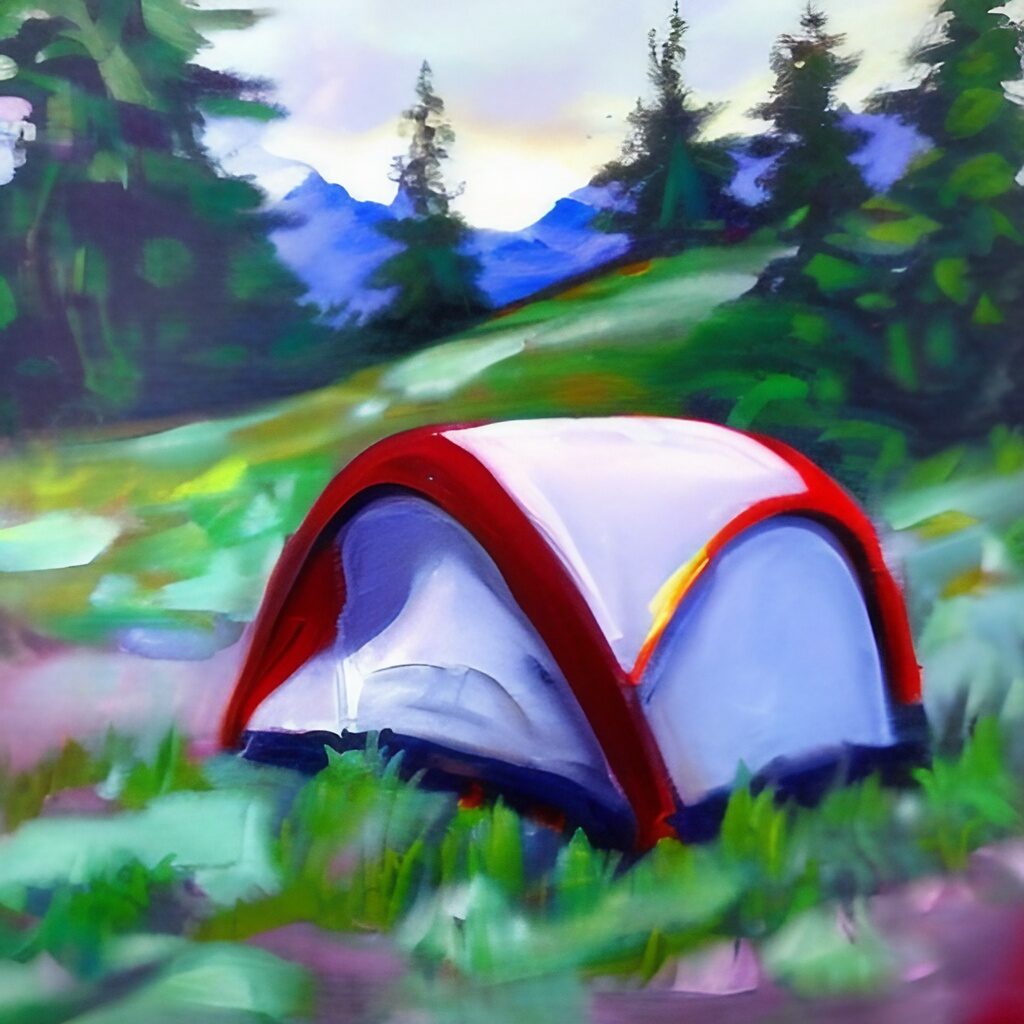
Conclusion – Is It Safe to Sleep In A Tent?
Sleeping in a tent is, statistically speaking, an extremely safe activity. As with any new endeavor, the experience will help you build the skill set, knowledge, and tools to camp safely in adverse weather conditions and diverse terrains.
With some education, research, and curiosity, you can have a safe and enjoyable time exploring the great outdoors.
Frequently Asked Questions – Is It Safe to Sleep In A Tent?
1. Is Sleeping in a Tent Safe? – FAQs
Yes, it is generally safe to sleep in a tent. However, there are some safety concerns that should be addressed.
2. What are Some Common Safety Concerns When Tent Camping? – FAQs
Wildlife encounters, carbon monoxide poisoning from heating sources, fires caused by cooking stoves or heaters inside the tent, and theft are all common safety concerns.
3. How Can I Keep Wildlife at Bay While Camping in a Tent? – FAQs
To keep wildlife at bay while camping in a tent, keep food away from your sleeping area and, if necessary, use bear-resistant containers. Avoid bringing scented items into your tent, such as toiletries and perfumes, and consider carrying bear spray or other deterrents.
4. What Should I Do if I Come Into Contact with a Dangerous Animal While Camping? – FAQs
Stay calm and avoid running away if you come across dangerous animals while camping, such as bears or mountain lions. Raise your arms above your head and make loud noises to make yourself appear larger. Back away slowly, keeping your back to the animal.
5. Is There a Risk of Carbon Monoxide Poisoning When Sleeping in a Tent with a Stove or Heater? – FAQs
Yes, if stoves or heaters are not properly ventilated inside your tent, they can cause carbon monoxide poisoning.
6. How Can I Keep Fires From Starting Inside My Tent When I’m Using Cooking Stoves or Heaters? – FAQs
To avoid fires when using cooking stoves or heaters inside your tent, place them on stable surfaces away from flammable materials such as bedding or clothing. Never use them without adequate ventilation and never leave them unattended.
7. Are There Any Specific Safety Precautions to Take When Camping During Severe Weather Conditions Such as Thunderstorms or High Winds? – FAQs
If possible, seek shelter in sturdy buildings or vehicles during severe weather conditions such as thunderstorms or high winds. If you must stay outside, avoid camping near tall trees or bodies of water, and take precautions to secure your gear against strong winds.
8. What Should I Do if Someone Attempts to Enter My Tent While I am Sleeping? – FAQs
If someone tries to break into your tent while you’re sleeping, call out loudly to alert others nearby and make noise or shine a flashlight at the intruder to scare them away.
9. How Can I Stay Safe and Comfortable While Camping in Remote Areas Alone? – FAQs
To stay safe and comfortable while camping alone in remote areas, let someone know where you’re going and when you expect to return. Carry appropriate weather gear, such as first aid supplies and emergency communication devices, such as satellite phones or personal locator beacons (PLBs). Set up camp early enough so that you have enough time before dark to establish good visibility around your site.

